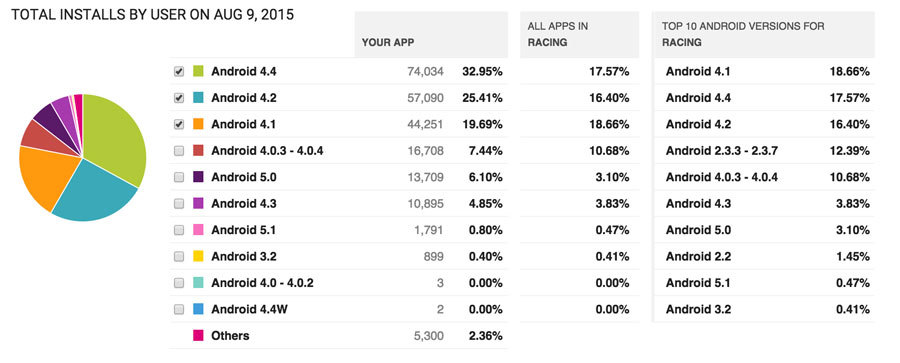Yep, just tested mine too with 4.4.4 and it works ok.
I too have similar settings that you have, but I use 13 as my version.
But for project.properties, I think that is generated by the android tools that the cocos console executes, so changes there wont make an impact.
I don’t have a setting for APP_PLATFORM in Application.mk.
But I do have the min and target sdk set in AndroidManifest.xml.
If you dont set the target, then it defaults to the minimum sdk that is defined.
Details about what to set that here: http://developer.android.com/guide/topics/manifest/uses-sdk-element.html
For other folks, they might need to verify the sdk versions that they have installed. This can be done from the command line:
android update sdk
The android command line tool is located in the tools folder in the android sdk folder.
Not certain if that matters, but I have API-22, 21 and 13 installed for mine to work ok. Haven’t tested it with just having 22 installed.
Regarding the SDK version number to support…
I’ve had about 900,000 downloads of my Android games in the past year and this is what my stats look like for one of my games that has about 225,000 downloads. The other games have similar distributions for Android version.
So I am missing out on a little bit of the available market by targeting >= API-13 (Android 3.2), but not much. And my games would probably run like crap on the older devices that ar running 2.x anyway, so no big deal.
So the devices that are less than API-16 (Android 4.1) make up about 25% of the market (at least for racing games).
I dont see any reason not to add in at least API-15 (4.0.3) which gives you an extra 10% of the market that you wouldn’t get if you chose API-16 as a min.
But these stats might vary by genre.
Testing on Android is tough.
There are services you can pay if you really want to be thorough, but I have not tried them.
I buy Nexus devices since Google makes it easy to quickly re-image the OS: https://developers.google.com/android/nexus/images?hl=en
I also bought some Samsung phones and and cheap Asus and other brand tablets.
Now that Android supports 64-bit, I had to buy a Nexus 9 with a 64-bit cpu.
But even with a simple testing setup of several devices it seems to have been effective enough for the games I have published.

 XD Couldn’t have done it without you, and now I finally understand how this works. Having not built any android apps before I didn’t understand how all the pieces fit together till now.
XD Couldn’t have done it without you, and now I finally understand how this works. Having not built any android apps before I didn’t understand how all the pieces fit together till now.